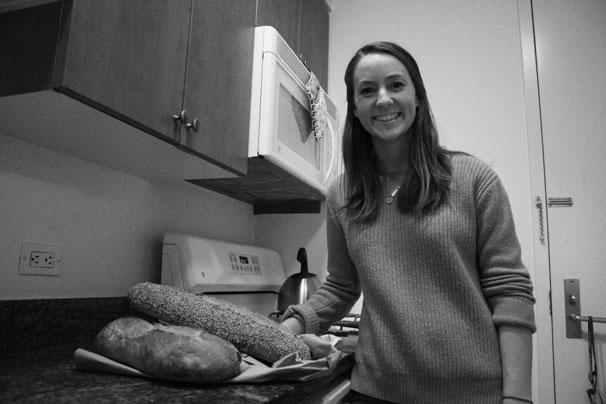
Adele Beasley started her own business when she was in the fifth grade.
It was then, in Tulsa, Okla., that Beasley and her cousin Jack Davis faced the stark realization that moving on to middle school meant they had outgrown running lemonade stands as a summer job. With cooking guidance from their mothers, the pair decided to upgrade to making and selling bread around town.
“We called it Heavenly Bread because my cousin said, ‘Who wouldn’t want to buy something called heavenly?’” Beasley, a Gallatin junior, said. “We made T-shirts, built a website and then delivered [the bread] on our bikes to friends and family in the neighborhood.”
But it was not until recently that Heavenly Bread Co. transformed into the popular micro-bakery it is today. When Beasley was a sophomore at NYU, she received valuable advice from her professor in an entrepreneurship class.
“The professor told us the best way to learn entrepreneurship is by doing it, especially social entrepreneurship,” Beasley said. “[He said] you have to learn by doing. You’re not going to learn in a desk.”
The advice proved fruitful for Beasley, who then called Davis — at school in Arkansas at the time — and suggested they relaunch their childhood bread company, but with a focus on social entrepreneurship. Oklahoma, which lacks adequate employment opportunities, has the highest rate of incarcerated females in the United States. Knowing this, Beasley wanted to help change the way the women integrate back into society.
“We could use the bread business to provide employment opportunities for women as they’re re-entering the community,” she said.
Armed with nothing but a partner and an idea — Heavenly Bread did not even have a work space yet — Beasley made some calls and collaborated with the Resonance Center for Women, a nonprofit devoted to helping women in Tulsa, in the summer of 2013. Beasley stayed in Tulsa last semester to oversee the relaunch and to complete an independent study on the company.
Beasley also makes an effort to inspire her peers to make a difference.
In December, Beasley did a TEDx talk in Lake Aluma, Okla., using Heavenly Bread to show what social entrepreneurship can accomplish.
Stern senior Erin Ahmed, who saw the TEDx talk, said Beasley’s enthusiastic yet calm demeanor helped get others interested in the discussion’s topic.
“She talks a lot about empathy and that speaks a lot about her personality,” Ahmed said. “She’s very personable, very friendly. She’s really approachable, and I think everybody who meets her can see that.”
While Beasley finishes her degree in New York, two employees are operating Heavenly Bread back home. Beasley said she misses the company and plans to bring a slice of Heavenly Bread to her friends here in the city.
“They’ve heard a lot about the bread bakery,” Beasley said. “I think we’re going to rent kitchen space and do a bread class, and bake the bread and everybody can try it.”
The kind of love Beasley has for food is genetic — her mother is a dietitian who loves to cook and her grandfather started a fast-food company that her family still operates.
“I grew up in a family of foodies,” she said. “[It] is just in my blood.”
Beasley has no plans of deviating from her family’s food-filled path any time soon. Her dream job is to be the CEO of a successful food company. She plans to continue working in social entrepreneurship and the natural food business.
Even if Beasley were to leave the bread business today, she has already accomplished something as a college student that many entrepreneurs have been working to achieve their entire careers.
“One thing I think we are really successful at is helping people understand that you can do business and do good, and you can do good and be sustainable.”
— Ann Schmidt
*Correction: A previous version of this article stated that Beasley was a Stern junior. She is a Gallatin junior. WSN regrets the error.
























































































































































